Rewards System Impact on Employee Performance, UK Construction
VerifiedAdded on 2023/01/06
|22
|5139
|38
Project
AI Summary
This project proposal examines the effects of reward systems on employee retention and performance within the UK construction industry, using Morgan Sindall Group plc as a case study. The research aims to analyze the concept, significance, and various types of reward systems, including monetary and non-monetary incentives. It explores the impact of these systems on employee morale, motivation, and long-term retention, while also identifying challenges faced by management in developing effective reward strategies. The study employs a mixed-methods approach, combining literature reviews, surveys, and potentially interviews, to gather data and draw conclusions about the relationship between reward systems, employee performance, and retention rates. The research considers ethical implications and limitations, aiming to contribute valuable insights to the field of human resource management within the construction sector. The project investigates the challenges in developing reward systems, such as aligning rewards with performance and the labor market, and proposes solutions to enhance employee satisfaction and organizational success.
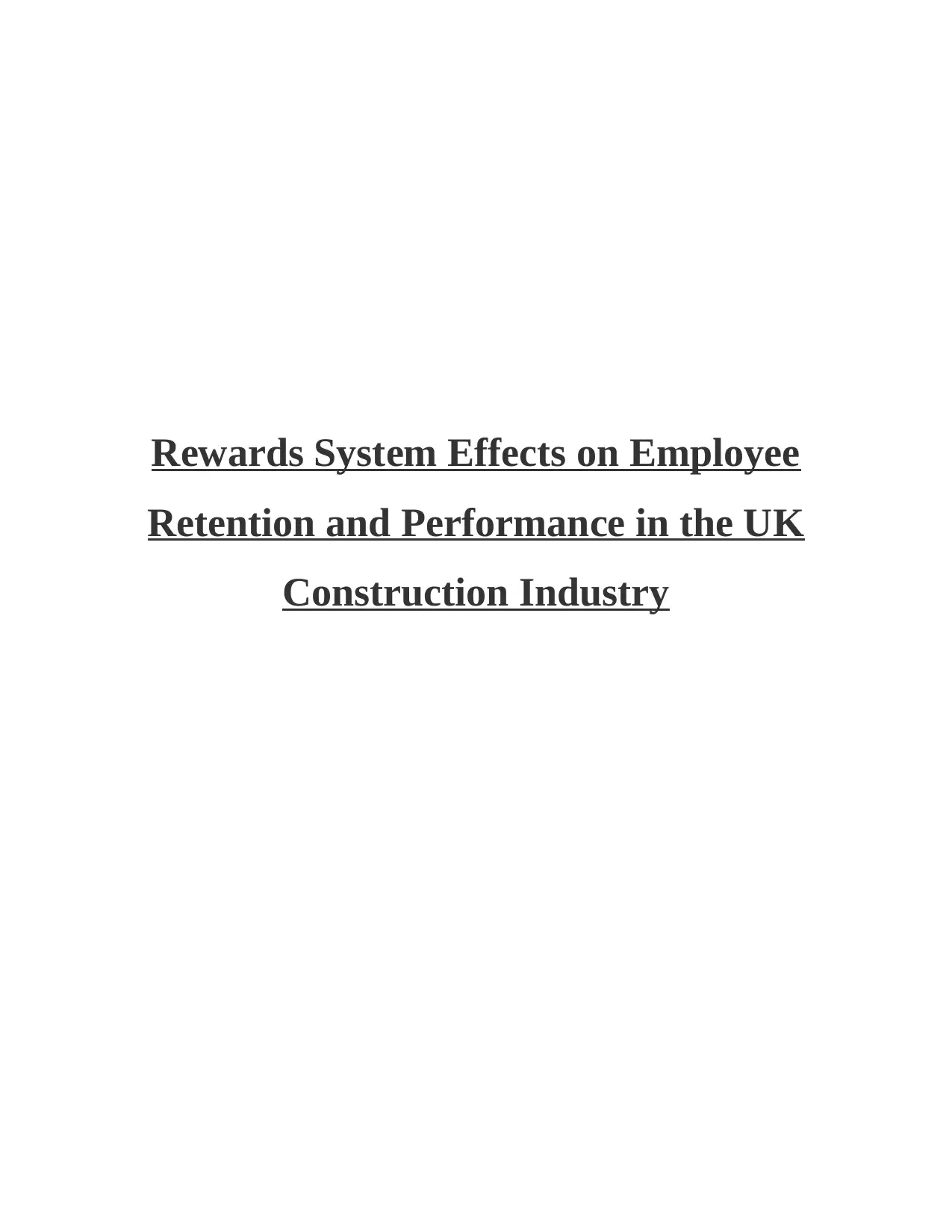
Rewards System Effects on Employee
Retention and Performance in the UK
Construction Industry
Retention and Performance in the UK
Construction Industry
Paraphrase This Document
Need a fresh take? Get an instant paraphrase of this document with our AI Paraphraser
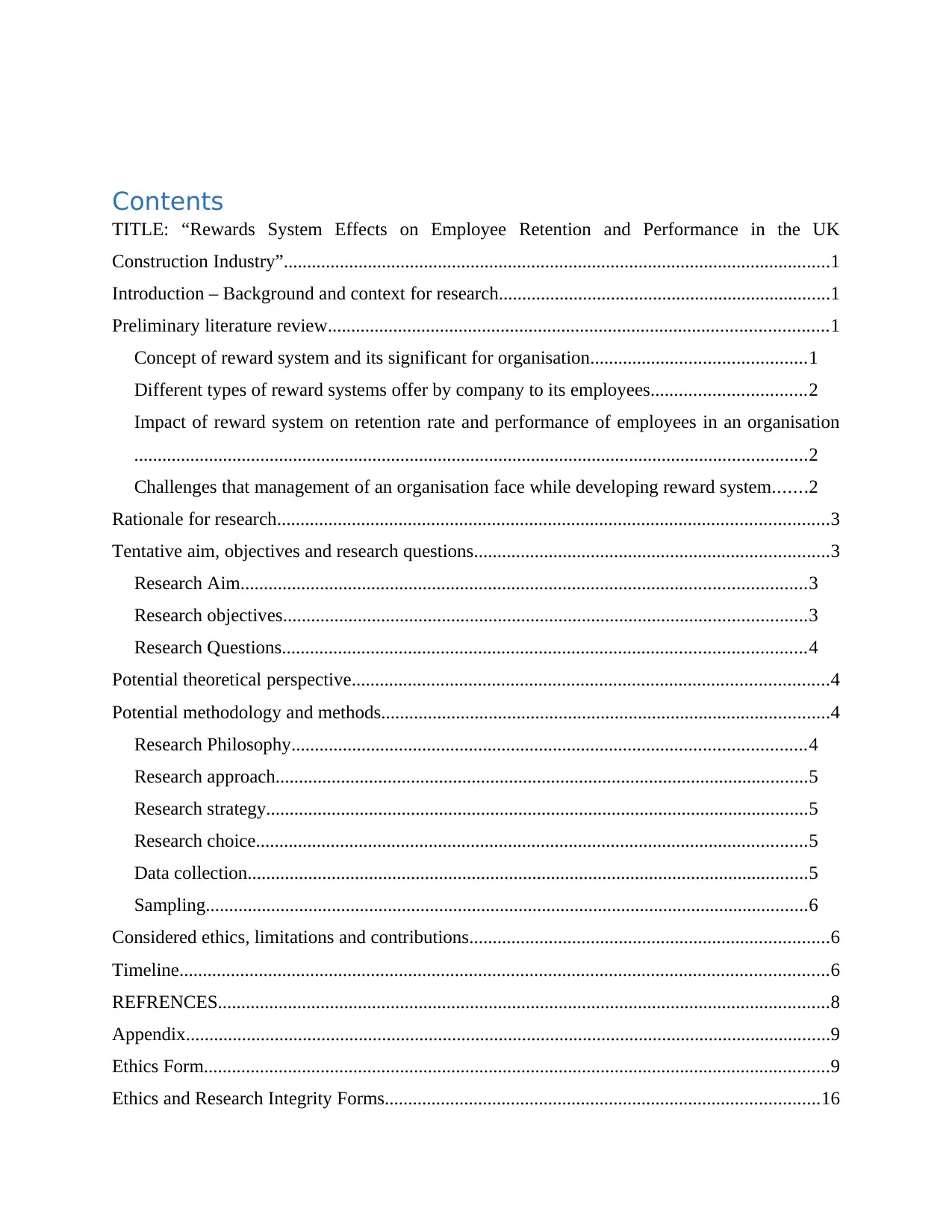
Contents
TITLE: “Rewards System Effects on Employee Retention and Performance in the UK
Construction Industry”.....................................................................................................................1
Introduction – Background and context for research.......................................................................1
Preliminary literature review...........................................................................................................1
Concept of reward system and its significant for organisation..............................................1
Different types of reward systems offer by company to its employees.................................2
Impact of reward system on retention rate and performance of employees in an organisation
................................................................................................................................................2
Challenges that management of an organisation face while developing reward system.......2
Rationale for research......................................................................................................................3
Tentative aim, objectives and research questions............................................................................3
Research Aim.........................................................................................................................3
Research objectives................................................................................................................3
Research Questions................................................................................................................4
Potential theoretical perspective......................................................................................................4
Potential methodology and methods................................................................................................4
Research Philosophy..............................................................................................................4
Research approach..................................................................................................................5
Research strategy....................................................................................................................5
Research choice......................................................................................................................5
Data collection........................................................................................................................5
Sampling.................................................................................................................................6
Considered ethics, limitations and contributions.............................................................................6
Timeline...........................................................................................................................................6
REFRENCES...................................................................................................................................8
Appendix..........................................................................................................................................9
Ethics Form......................................................................................................................................9
Ethics and Research Integrity Forms.............................................................................................16
TITLE: “Rewards System Effects on Employee Retention and Performance in the UK
Construction Industry”.....................................................................................................................1
Introduction – Background and context for research.......................................................................1
Preliminary literature review...........................................................................................................1
Concept of reward system and its significant for organisation..............................................1
Different types of reward systems offer by company to its employees.................................2
Impact of reward system on retention rate and performance of employees in an organisation
................................................................................................................................................2
Challenges that management of an organisation face while developing reward system.......2
Rationale for research......................................................................................................................3
Tentative aim, objectives and research questions............................................................................3
Research Aim.........................................................................................................................3
Research objectives................................................................................................................3
Research Questions................................................................................................................4
Potential theoretical perspective......................................................................................................4
Potential methodology and methods................................................................................................4
Research Philosophy..............................................................................................................4
Research approach..................................................................................................................5
Research strategy....................................................................................................................5
Research choice......................................................................................................................5
Data collection........................................................................................................................5
Sampling.................................................................................................................................6
Considered ethics, limitations and contributions.............................................................................6
Timeline...........................................................................................................................................6
REFRENCES...................................................................................................................................8
Appendix..........................................................................................................................................9
Ethics Form......................................................................................................................................9
Ethics and Research Integrity Forms.............................................................................................16

⊘ This is a preview!⊘
Do you want full access?
Subscribe today to unlock all pages.

Trusted by 1+ million students worldwide
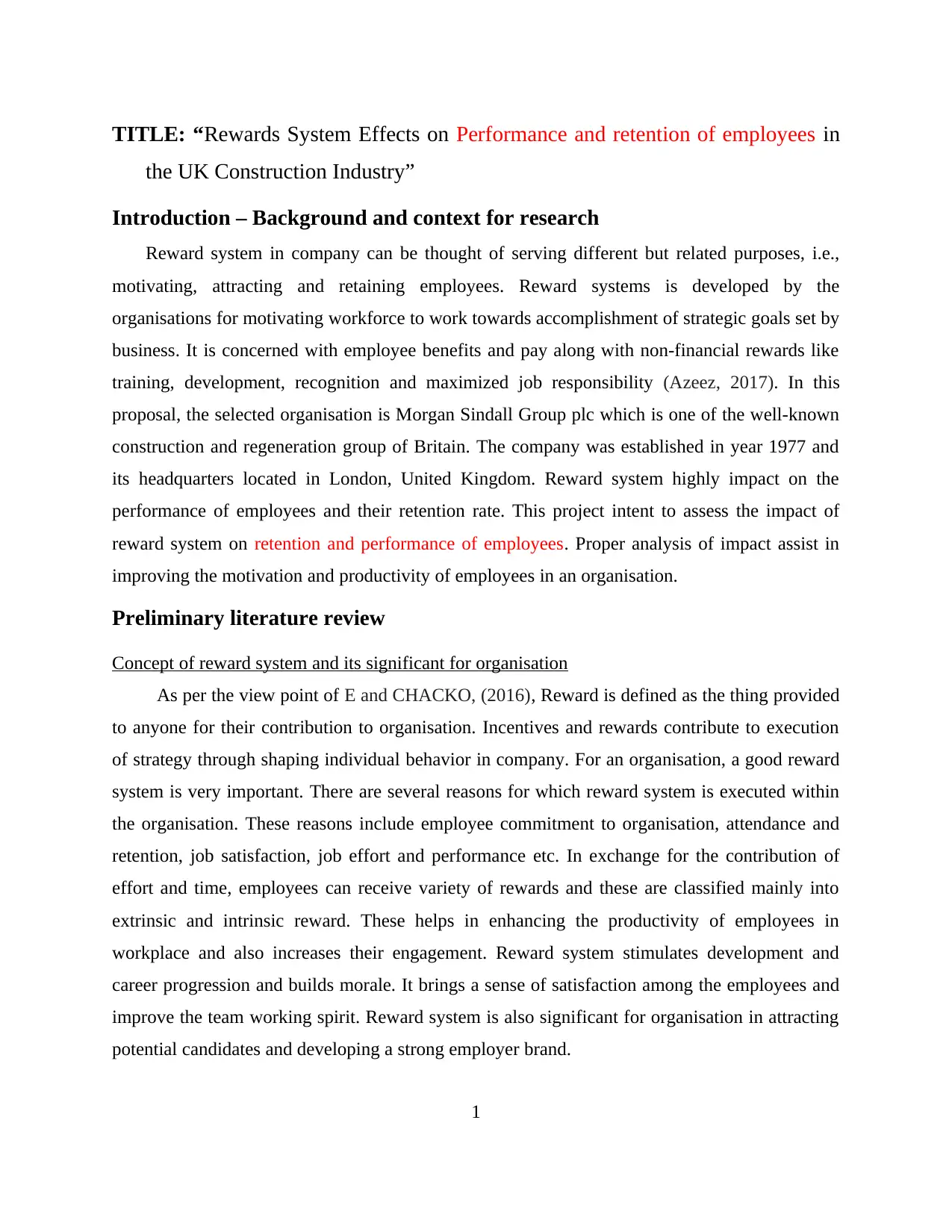
TITLE: “Rewards System Effects on Performance and retention of employees in
the UK Construction Industry”
Introduction – Background and context for research
Reward system in company can be thought of serving different but related purposes, i.e.,
motivating, attracting and retaining employees. Reward systems is developed by the
organisations for motivating workforce to work towards accomplishment of strategic goals set by
business. It is concerned with employee benefits and pay along with non-financial rewards like
training, development, recognition and maximized job responsibility (Azeez, 2017). In this
proposal, the selected organisation is Morgan Sindall Group plc which is one of the well-known
construction and regeneration group of Britain. The company was established in year 1977 and
its headquarters located in London, United Kingdom. Reward system highly impact on the
performance of employees and their retention rate. This project intent to assess the impact of
reward system on retention and performance of employees. Proper analysis of impact assist in
improving the motivation and productivity of employees in an organisation.
Preliminary literature review
Concept of reward system and its significant for organisation
As per the view point of E and CHACKO, (2016), Reward is defined as the thing provided
to anyone for their contribution to organisation. Incentives and rewards contribute to execution
of strategy through shaping individual behavior in company. For an organisation, a good reward
system is very important. There are several reasons for which reward system is executed within
the organisation. These reasons include employee commitment to organisation, attendance and
retention, job satisfaction, job effort and performance etc. In exchange for the contribution of
effort and time, employees can receive variety of rewards and these are classified mainly into
extrinsic and intrinsic reward. These helps in enhancing the productivity of employees in
workplace and also increases their engagement. Reward system stimulates development and
career progression and builds morale. It brings a sense of satisfaction among the employees and
improve the team working spirit. Reward system is also significant for organisation in attracting
potential candidates and developing a strong employer brand.
1
the UK Construction Industry”
Introduction – Background and context for research
Reward system in company can be thought of serving different but related purposes, i.e.,
motivating, attracting and retaining employees. Reward systems is developed by the
organisations for motivating workforce to work towards accomplishment of strategic goals set by
business. It is concerned with employee benefits and pay along with non-financial rewards like
training, development, recognition and maximized job responsibility (Azeez, 2017). In this
proposal, the selected organisation is Morgan Sindall Group plc which is one of the well-known
construction and regeneration group of Britain. The company was established in year 1977 and
its headquarters located in London, United Kingdom. Reward system highly impact on the
performance of employees and their retention rate. This project intent to assess the impact of
reward system on retention and performance of employees. Proper analysis of impact assist in
improving the motivation and productivity of employees in an organisation.
Preliminary literature review
Concept of reward system and its significant for organisation
As per the view point of E and CHACKO, (2016), Reward is defined as the thing provided
to anyone for their contribution to organisation. Incentives and rewards contribute to execution
of strategy through shaping individual behavior in company. For an organisation, a good reward
system is very important. There are several reasons for which reward system is executed within
the organisation. These reasons include employee commitment to organisation, attendance and
retention, job satisfaction, job effort and performance etc. In exchange for the contribution of
effort and time, employees can receive variety of rewards and these are classified mainly into
extrinsic and intrinsic reward. These helps in enhancing the productivity of employees in
workplace and also increases their engagement. Reward system stimulates development and
career progression and builds morale. It brings a sense of satisfaction among the employees and
improve the team working spirit. Reward system is also significant for organisation in attracting
potential candidates and developing a strong employer brand.
1
Paraphrase This Document
Need a fresh take? Get an instant paraphrase of this document with our AI Paraphraser
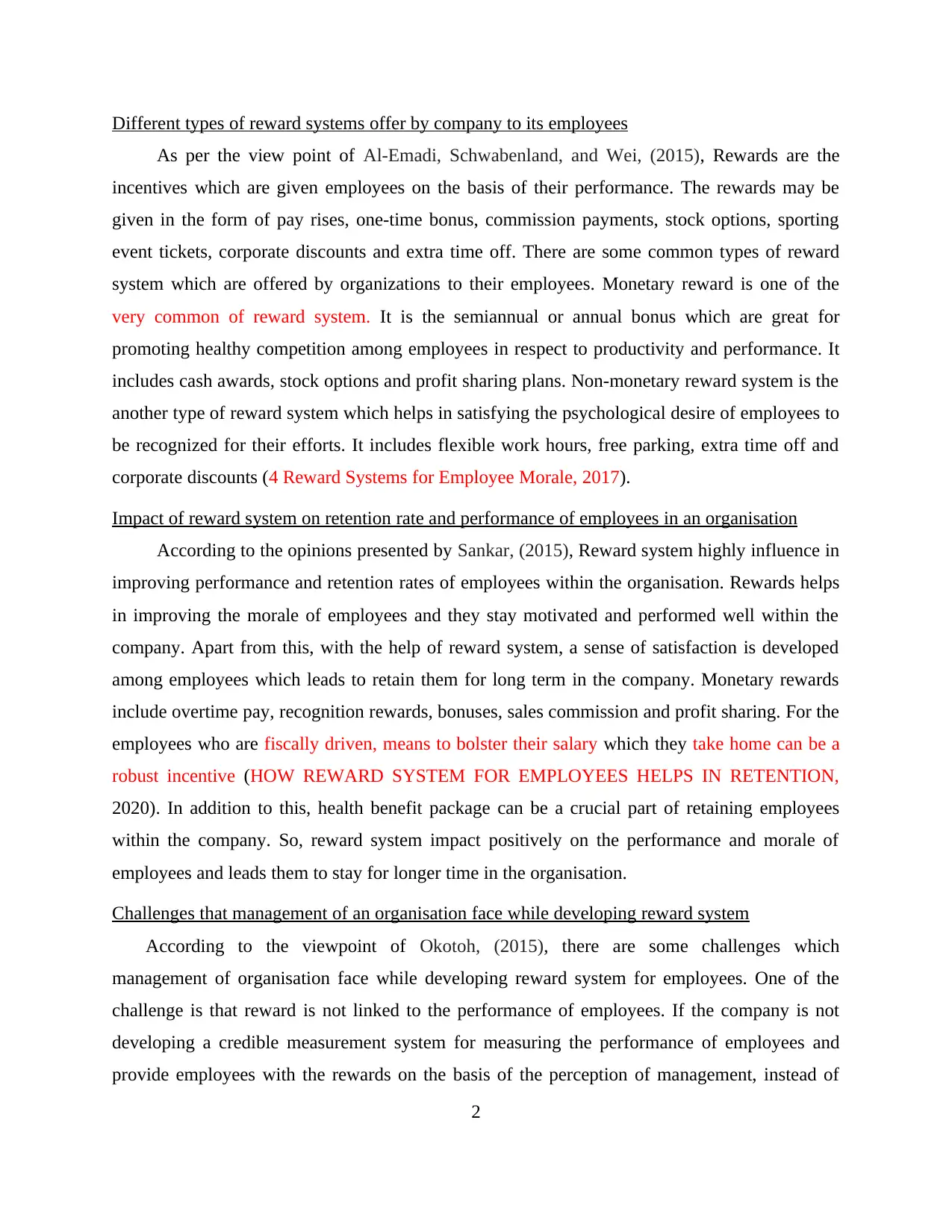
Different types of reward systems offer by company to its employees
As per the view point of Al-Emadi, Schwabenland, and Wei, (2015), Rewards are the
incentives which are given employees on the basis of their performance. The rewards may be
given in the form of pay rises, one-time bonus, commission payments, stock options, sporting
event tickets, corporate discounts and extra time off. There are some common types of reward
system which are offered by organizations to their employees. Monetary reward is one of the
very common of reward system. It is the semiannual or annual bonus which are great for
promoting healthy competition among employees in respect to productivity and performance. It
includes cash awards, stock options and profit sharing plans. Non-monetary reward system is the
another type of reward system which helps in satisfying the psychological desire of employees to
be recognized for their efforts. It includes flexible work hours, free parking, extra time off and
corporate discounts (4 Reward Systems for Employee Morale, 2017).
Impact of reward system on retention rate and performance of employees in an organisation
According to the opinions presented by Sankar, (2015), Reward system highly influence in
improving performance and retention rates of employees within the organisation. Rewards helps
in improving the morale of employees and they stay motivated and performed well within the
company. Apart from this, with the help of reward system, a sense of satisfaction is developed
among employees which leads to retain them for long term in the company. Monetary rewards
include overtime pay, recognition rewards, bonuses, sales commission and profit sharing. For the
employees who are fiscally driven, means to bolster their salary which they take home can be a
robust incentive (HOW REWARD SYSTEM FOR EMPLOYEES HELPS IN RETENTION,
2020). In addition to this, health benefit package can be a crucial part of retaining employees
within the company. So, reward system impact positively on the performance and morale of
employees and leads them to stay for longer time in the organisation.
Challenges that management of an organisation face while developing reward system
According to the viewpoint of Okotoh, (2015), there are some challenges which
management of organisation face while developing reward system for employees. One of the
challenge is that reward is not linked to the performance of employees. If the company is not
developing a credible measurement system for measuring the performance of employees and
provide employees with the rewards on the basis of the perception of management, instead of
2
As per the view point of Al-Emadi, Schwabenland, and Wei, (2015), Rewards are the
incentives which are given employees on the basis of their performance. The rewards may be
given in the form of pay rises, one-time bonus, commission payments, stock options, sporting
event tickets, corporate discounts and extra time off. There are some common types of reward
system which are offered by organizations to their employees. Monetary reward is one of the
very common of reward system. It is the semiannual or annual bonus which are great for
promoting healthy competition among employees in respect to productivity and performance. It
includes cash awards, stock options and profit sharing plans. Non-monetary reward system is the
another type of reward system which helps in satisfying the psychological desire of employees to
be recognized for their efforts. It includes flexible work hours, free parking, extra time off and
corporate discounts (4 Reward Systems for Employee Morale, 2017).
Impact of reward system on retention rate and performance of employees in an organisation
According to the opinions presented by Sankar, (2015), Reward system highly influence in
improving performance and retention rates of employees within the organisation. Rewards helps
in improving the morale of employees and they stay motivated and performed well within the
company. Apart from this, with the help of reward system, a sense of satisfaction is developed
among employees which leads to retain them for long term in the company. Monetary rewards
include overtime pay, recognition rewards, bonuses, sales commission and profit sharing. For the
employees who are fiscally driven, means to bolster their salary which they take home can be a
robust incentive (HOW REWARD SYSTEM FOR EMPLOYEES HELPS IN RETENTION,
2020). In addition to this, health benefit package can be a crucial part of retaining employees
within the company. So, reward system impact positively on the performance and morale of
employees and leads them to stay for longer time in the organisation.
Challenges that management of an organisation face while developing reward system
According to the viewpoint of Okotoh, (2015), there are some challenges which
management of organisation face while developing reward system for employees. One of the
challenge is that reward is not linked to the performance of employees. If the company is not
developing a credible measurement system for measuring the performance of employees and
provide employees with the rewards on the basis of the perception of management, instead of
2
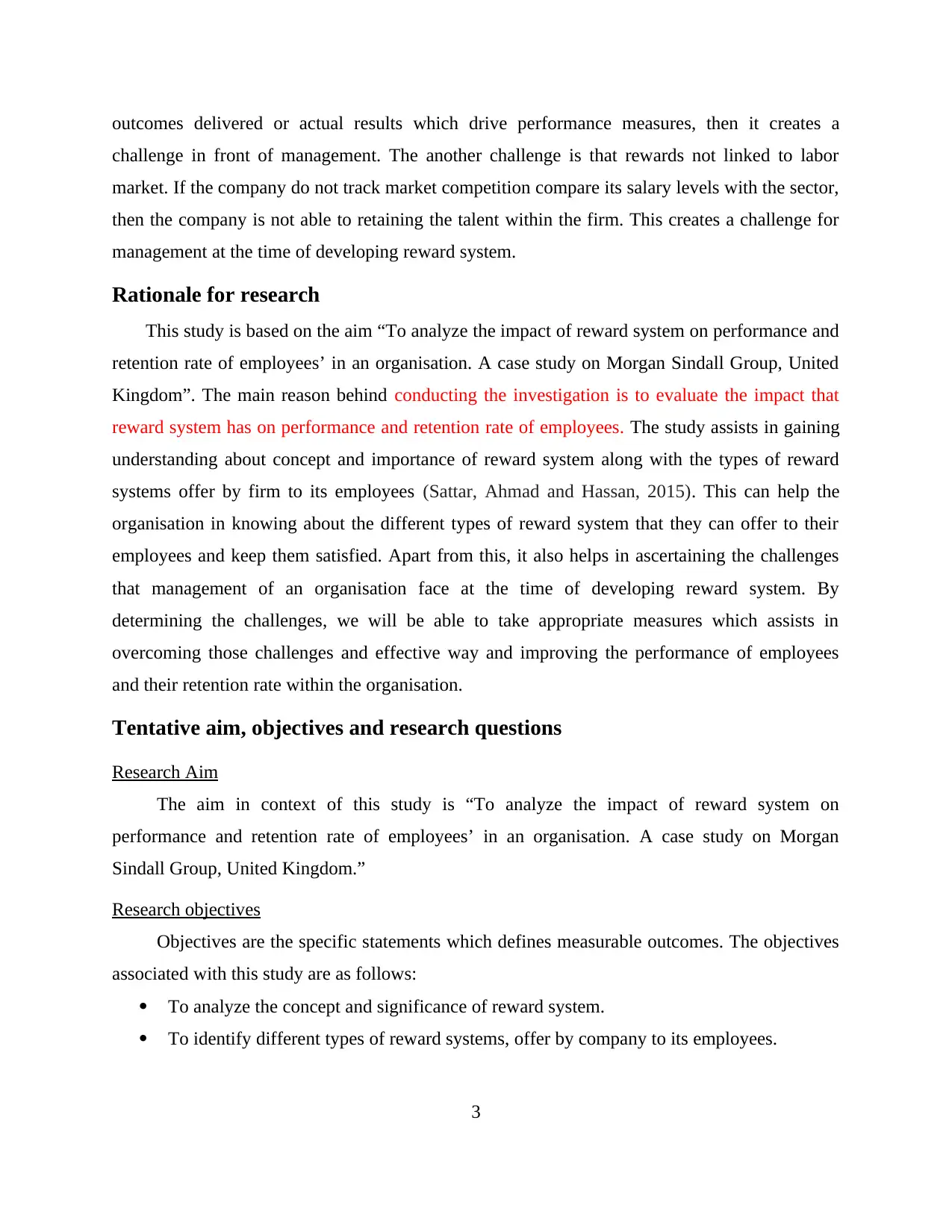
outcomes delivered or actual results which drive performance measures, then it creates a
challenge in front of management. The another challenge is that rewards not linked to labor
market. If the company do not track market competition compare its salary levels with the sector,
then the company is not able to retaining the talent within the firm. This creates a challenge for
management at the time of developing reward system.
Rationale for research
This study is based on the aim “To analyze the impact of reward system on performance and
retention rate of employees’ in an organisation. A case study on Morgan Sindall Group, United
Kingdom”. The main reason behind conducting the investigation is to evaluate the impact that
reward system has on performance and retention rate of employees. The study assists in gaining
understanding about concept and importance of reward system along with the types of reward
systems offer by firm to its employees (Sattar, Ahmad and Hassan, 2015). This can help the
organisation in knowing about the different types of reward system that they can offer to their
employees and keep them satisfied. Apart from this, it also helps in ascertaining the challenges
that management of an organisation face at the time of developing reward system. By
determining the challenges, we will be able to take appropriate measures which assists in
overcoming those challenges and effective way and improving the performance of employees
and their retention rate within the organisation.
Tentative aim, objectives and research questions
Research Aim
The aim in context of this study is “To analyze the impact of reward system on
performance and retention rate of employees’ in an organisation. A case study on Morgan
Sindall Group, United Kingdom.”
Research objectives
Objectives are the specific statements which defines measurable outcomes. The objectives
associated with this study are as follows:
To analyze the concept and significance of reward system.
To identify different types of reward systems, offer by company to its employees.
3
challenge in front of management. The another challenge is that rewards not linked to labor
market. If the company do not track market competition compare its salary levels with the sector,
then the company is not able to retaining the talent within the firm. This creates a challenge for
management at the time of developing reward system.
Rationale for research
This study is based on the aim “To analyze the impact of reward system on performance and
retention rate of employees’ in an organisation. A case study on Morgan Sindall Group, United
Kingdom”. The main reason behind conducting the investigation is to evaluate the impact that
reward system has on performance and retention rate of employees. The study assists in gaining
understanding about concept and importance of reward system along with the types of reward
systems offer by firm to its employees (Sattar, Ahmad and Hassan, 2015). This can help the
organisation in knowing about the different types of reward system that they can offer to their
employees and keep them satisfied. Apart from this, it also helps in ascertaining the challenges
that management of an organisation face at the time of developing reward system. By
determining the challenges, we will be able to take appropriate measures which assists in
overcoming those challenges and effective way and improving the performance of employees
and their retention rate within the organisation.
Tentative aim, objectives and research questions
Research Aim
The aim in context of this study is “To analyze the impact of reward system on
performance and retention rate of employees’ in an organisation. A case study on Morgan
Sindall Group, United Kingdom.”
Research objectives
Objectives are the specific statements which defines measurable outcomes. The objectives
associated with this study are as follows:
To analyze the concept and significance of reward system.
To identify different types of reward systems, offer by company to its employees.
3
⊘ This is a preview!⊘
Do you want full access?
Subscribe today to unlock all pages.

Trusted by 1+ million students worldwide
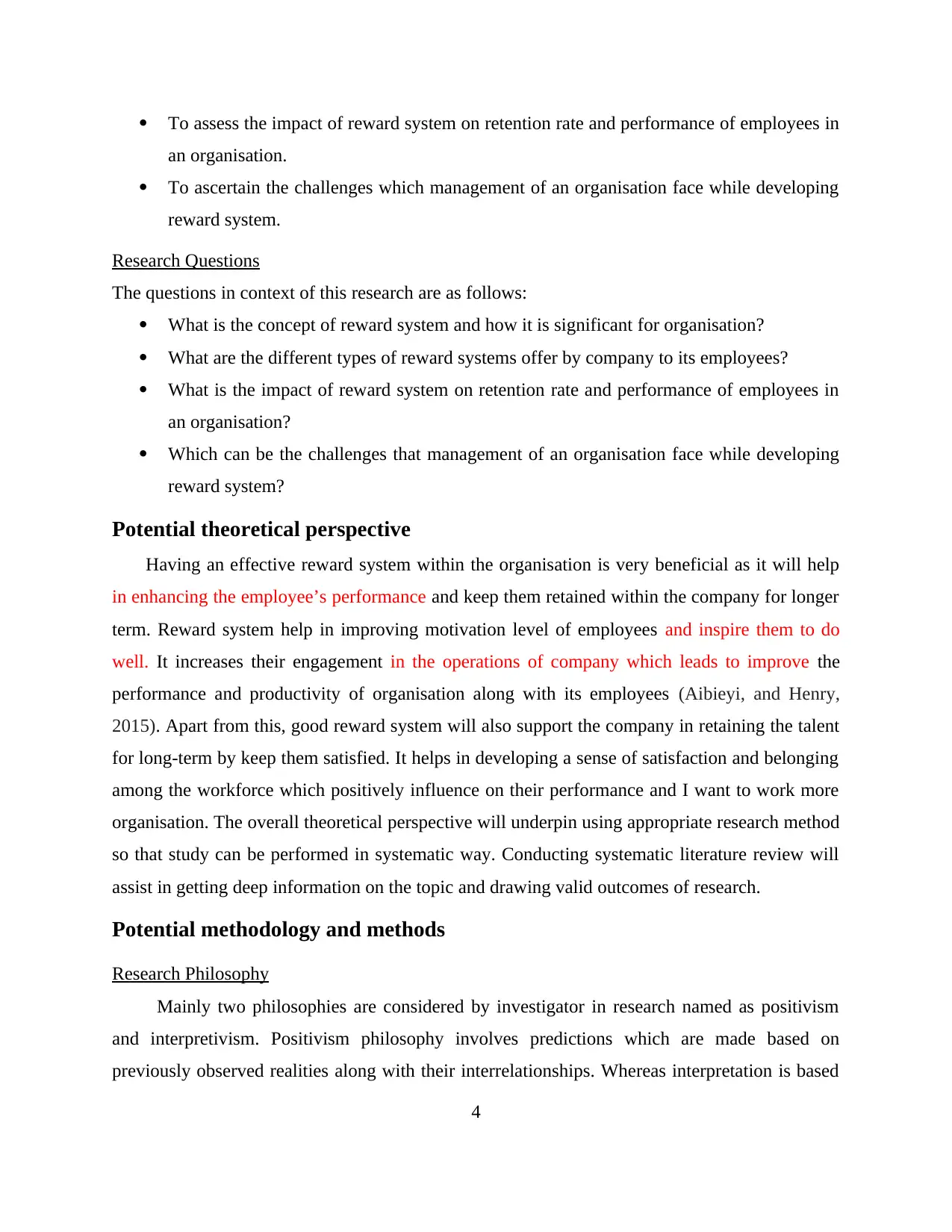
To assess the impact of reward system on retention rate and performance of employees in
an organisation.
To ascertain the challenges which management of an organisation face while developing
reward system.
Research Questions
The questions in context of this research are as follows:
What is the concept of reward system and how it is significant for organisation?
What are the different types of reward systems offer by company to its employees?
What is the impact of reward system on retention rate and performance of employees in
an organisation?
Which can be the challenges that management of an organisation face while developing
reward system?
Potential theoretical perspective
Having an effective reward system within the organisation is very beneficial as it will help
in enhancing the employee’s performance and keep them retained within the company for longer
term. Reward system help in improving motivation level of employees and inspire them to do
well. It increases their engagement in the operations of company which leads to improve the
performance and productivity of organisation along with its employees (Aibieyi, and Henry,
2015). Apart from this, good reward system will also support the company in retaining the talent
for long-term by keep them satisfied. It helps in developing a sense of satisfaction and belonging
among the workforce which positively influence on their performance and I want to work more
organisation. The overall theoretical perspective will underpin using appropriate research method
so that study can be performed in systematic way. Conducting systematic literature review will
assist in getting deep information on the topic and drawing valid outcomes of research.
Potential methodology and methods
Research Philosophy
Mainly two philosophies are considered by investigator in research named as positivism
and interpretivism. Positivism philosophy involves predictions which are made based on
previously observed realities along with their interrelationships. Whereas interpretation is based
4
an organisation.
To ascertain the challenges which management of an organisation face while developing
reward system.
Research Questions
The questions in context of this research are as follows:
What is the concept of reward system and how it is significant for organisation?
What are the different types of reward systems offer by company to its employees?
What is the impact of reward system on retention rate and performance of employees in
an organisation?
Which can be the challenges that management of an organisation face while developing
reward system?
Potential theoretical perspective
Having an effective reward system within the organisation is very beneficial as it will help
in enhancing the employee’s performance and keep them retained within the company for longer
term. Reward system help in improving motivation level of employees and inspire them to do
well. It increases their engagement in the operations of company which leads to improve the
performance and productivity of organisation along with its employees (Aibieyi, and Henry,
2015). Apart from this, good reward system will also support the company in retaining the talent
for long-term by keep them satisfied. It helps in developing a sense of satisfaction and belonging
among the workforce which positively influence on their performance and I want to work more
organisation. The overall theoretical perspective will underpin using appropriate research method
so that study can be performed in systematic way. Conducting systematic literature review will
assist in getting deep information on the topic and drawing valid outcomes of research.
Potential methodology and methods
Research Philosophy
Mainly two philosophies are considered by investigator in research named as positivism
and interpretivism. Positivism philosophy involves predictions which are made based on
previously observed realities along with their interrelationships. Whereas interpretation is based
4
Paraphrase This Document
Need a fresh take? Get an instant paraphrase of this document with our AI Paraphraser
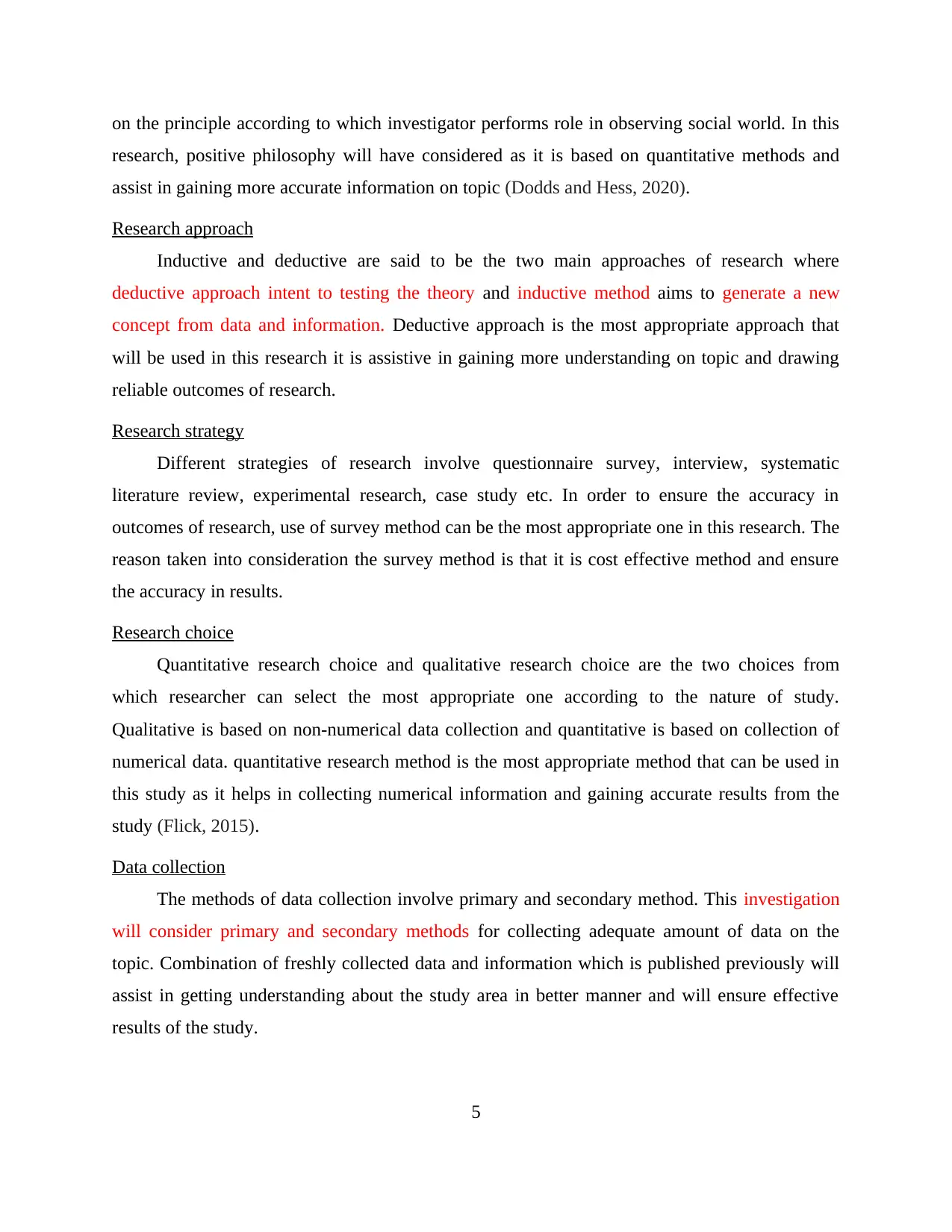
on the principle according to which investigator performs role in observing social world. In this
research, positive philosophy will have considered as it is based on quantitative methods and
assist in gaining more accurate information on topic (Dodds and Hess, 2020).
Research approach
Inductive and deductive are said to be the two main approaches of research where
deductive approach intent to testing the theory and inductive method aims to generate a new
concept from data and information. Deductive approach is the most appropriate approach that
will be used in this research it is assistive in gaining more understanding on topic and drawing
reliable outcomes of research.
Research strategy
Different strategies of research involve questionnaire survey, interview, systematic
literature review, experimental research, case study etc. In order to ensure the accuracy in
outcomes of research, use of survey method can be the most appropriate one in this research. The
reason taken into consideration the survey method is that it is cost effective method and ensure
the accuracy in results.
Research choice
Quantitative research choice and qualitative research choice are the two choices from
which researcher can select the most appropriate one according to the nature of study.
Qualitative is based on non-numerical data collection and quantitative is based on collection of
numerical data. quantitative research method is the most appropriate method that can be used in
this study as it helps in collecting numerical information and gaining accurate results from the
study (Flick, 2015).
Data collection
The methods of data collection involve primary and secondary method. This investigation
will consider primary and secondary methods for collecting adequate amount of data on the
topic. Combination of freshly collected data and information which is published previously will
assist in getting understanding about the study area in better manner and will ensure effective
results of the study.
5
research, positive philosophy will have considered as it is based on quantitative methods and
assist in gaining more accurate information on topic (Dodds and Hess, 2020).
Research approach
Inductive and deductive are said to be the two main approaches of research where
deductive approach intent to testing the theory and inductive method aims to generate a new
concept from data and information. Deductive approach is the most appropriate approach that
will be used in this research it is assistive in gaining more understanding on topic and drawing
reliable outcomes of research.
Research strategy
Different strategies of research involve questionnaire survey, interview, systematic
literature review, experimental research, case study etc. In order to ensure the accuracy in
outcomes of research, use of survey method can be the most appropriate one in this research. The
reason taken into consideration the survey method is that it is cost effective method and ensure
the accuracy in results.
Research choice
Quantitative research choice and qualitative research choice are the two choices from
which researcher can select the most appropriate one according to the nature of study.
Qualitative is based on non-numerical data collection and quantitative is based on collection of
numerical data. quantitative research method is the most appropriate method that can be used in
this study as it helps in collecting numerical information and gaining accurate results from the
study (Flick, 2015).
Data collection
The methods of data collection involve primary and secondary method. This investigation
will consider primary and secondary methods for collecting adequate amount of data on the
topic. Combination of freshly collected data and information which is published previously will
assist in getting understanding about the study area in better manner and will ensure effective
results of the study.
5
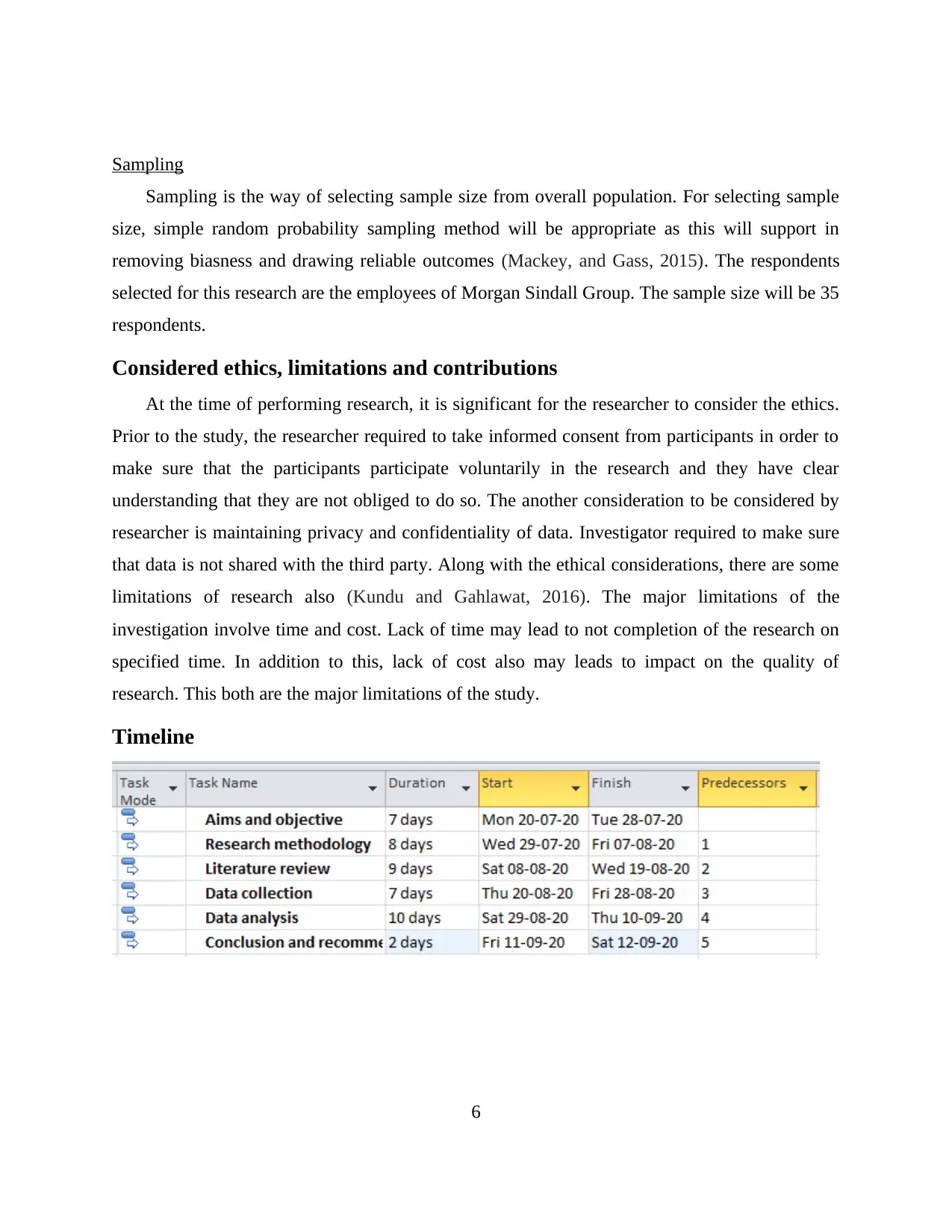
Sampling
Sampling is the way of selecting sample size from overall population. For selecting sample
size, simple random probability sampling method will be appropriate as this will support in
removing biasness and drawing reliable outcomes (Mackey, and Gass, 2015). The respondents
selected for this research are the employees of Morgan Sindall Group. The sample size will be 35
respondents.
Considered ethics, limitations and contributions
At the time of performing research, it is significant for the researcher to consider the ethics.
Prior to the study, the researcher required to take informed consent from participants in order to
make sure that the participants participate voluntarily in the research and they have clear
understanding that they are not obliged to do so. The another consideration to be considered by
researcher is maintaining privacy and confidentiality of data. Investigator required to make sure
that data is not shared with the third party. Along with the ethical considerations, there are some
limitations of research also (Kundu and Gahlawat, 2016). The major limitations of the
investigation involve time and cost. Lack of time may lead to not completion of the research on
specified time. In addition to this, lack of cost also may leads to impact on the quality of
research. This both are the major limitations of the study.
Timeline
6
Sampling is the way of selecting sample size from overall population. For selecting sample
size, simple random probability sampling method will be appropriate as this will support in
removing biasness and drawing reliable outcomes (Mackey, and Gass, 2015). The respondents
selected for this research are the employees of Morgan Sindall Group. The sample size will be 35
respondents.
Considered ethics, limitations and contributions
At the time of performing research, it is significant for the researcher to consider the ethics.
Prior to the study, the researcher required to take informed consent from participants in order to
make sure that the participants participate voluntarily in the research and they have clear
understanding that they are not obliged to do so. The another consideration to be considered by
researcher is maintaining privacy and confidentiality of data. Investigator required to make sure
that data is not shared with the third party. Along with the ethical considerations, there are some
limitations of research also (Kundu and Gahlawat, 2016). The major limitations of the
investigation involve time and cost. Lack of time may lead to not completion of the research on
specified time. In addition to this, lack of cost also may leads to impact on the quality of
research. This both are the major limitations of the study.
Timeline
6
⊘ This is a preview!⊘
Do you want full access?
Subscribe today to unlock all pages.

Trusted by 1+ million students worldwide
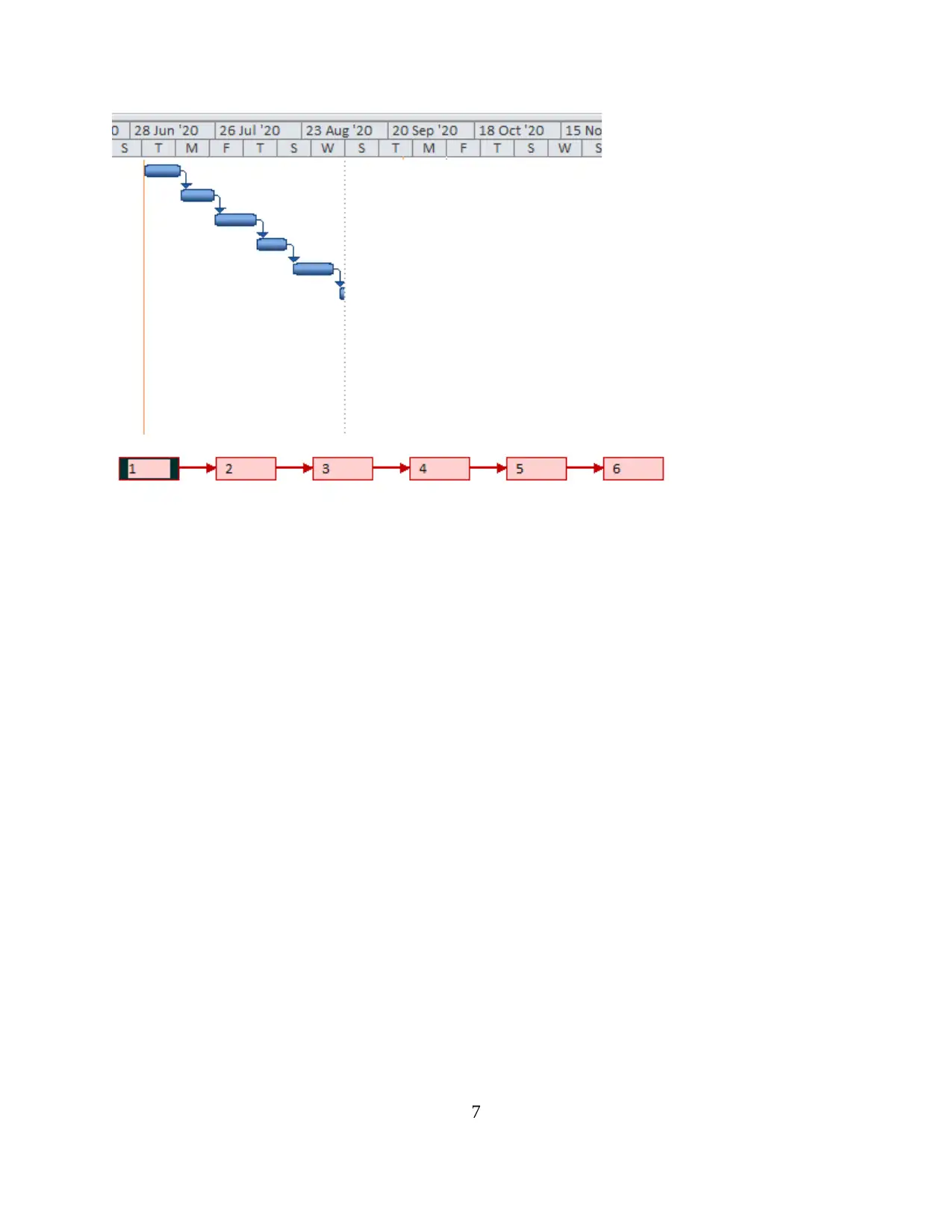
7
Paraphrase This Document
Need a fresh take? Get an instant paraphrase of this document with our AI Paraphraser
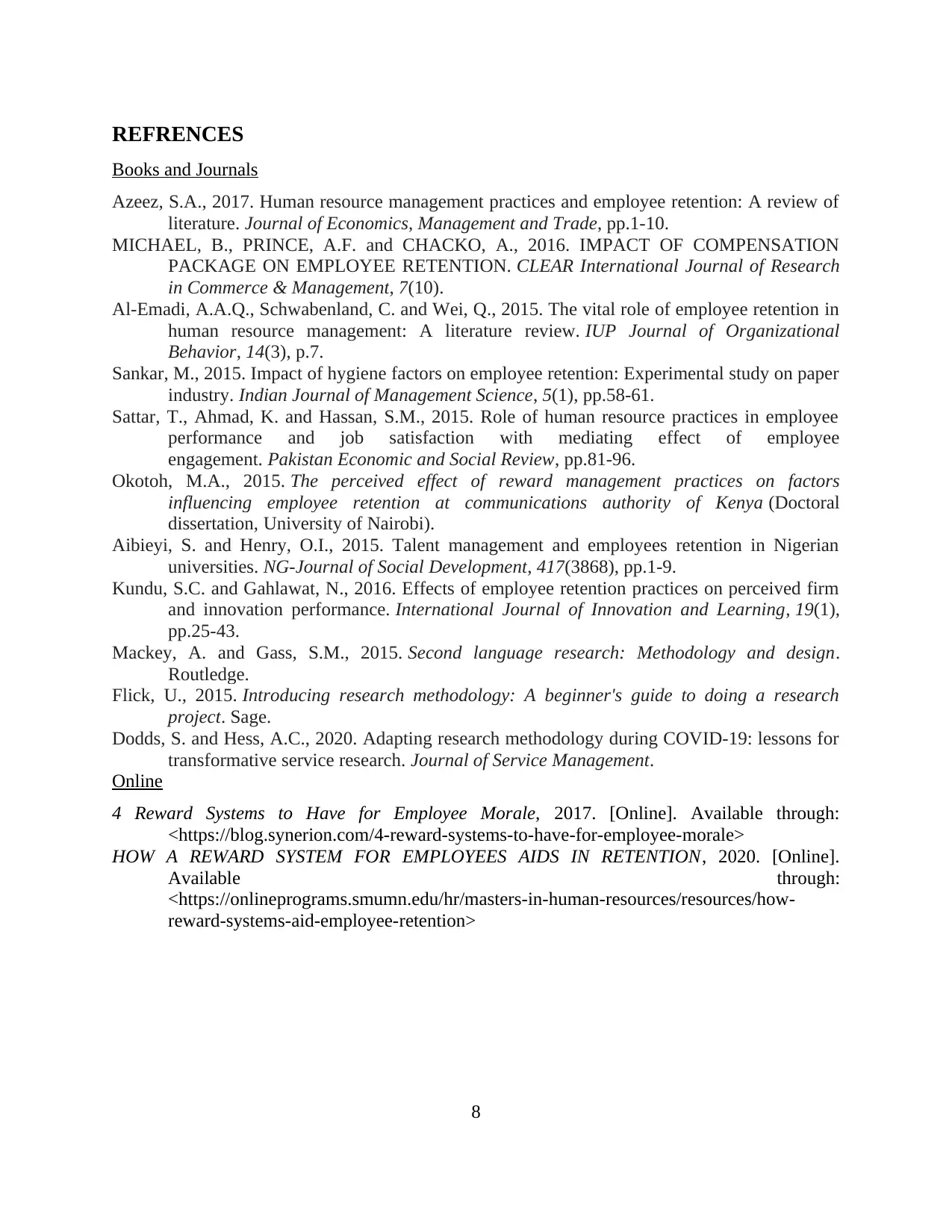
REFRENCES
Books and Journals
Azeez, S.A., 2017. Human resource management practices and employee retention: A review of
literature. Journal of Economics, Management and Trade, pp.1-10.
MICHAEL, B., PRINCE, A.F. and CHACKO, A., 2016. IMPACT OF COMPENSATION
PACKAGE ON EMPLOYEE RETENTION. CLEAR International Journal of Research
in Commerce & Management, 7(10).
Al-Emadi, A.A.Q., Schwabenland, C. and Wei, Q., 2015. The vital role of employee retention in
human resource management: A literature review. IUP Journal of Organizational
Behavior, 14(3), p.7.
Sankar, M., 2015. Impact of hygiene factors on employee retention: Experimental study on paper
industry. Indian Journal of Management Science, 5(1), pp.58-61.
Sattar, T., Ahmad, K. and Hassan, S.M., 2015. Role of human resource practices in employee
performance and job satisfaction with mediating effect of employee
engagement. Pakistan Economic and Social Review, pp.81-96.
Okotoh, M.A., 2015. The perceived effect of reward management practices on factors
influencing employee retention at communications authority of Kenya (Doctoral
dissertation, University of Nairobi).
Aibieyi, S. and Henry, O.I., 2015. Talent management and employees retention in Nigerian
universities. NG-Journal of Social Development, 417(3868), pp.1-9.
Kundu, S.C. and Gahlawat, N., 2016. Effects of employee retention practices on perceived firm
and innovation performance. International Journal of Innovation and Learning, 19(1),
pp.25-43.
Mackey, A. and Gass, S.M., 2015. Second language research: Methodology and design.
Routledge.
Flick, U., 2015. Introducing research methodology: A beginner's guide to doing a research
project. Sage.
Dodds, S. and Hess, A.C., 2020. Adapting research methodology during COVID-19: lessons for
transformative service research. Journal of Service Management.
Online
4 Reward Systems to Have for Employee Morale, 2017. [Online]. Available through:
<https://blog.synerion.com/4-reward-systems-to-have-for-employee-morale>
HOW A REWARD SYSTEM FOR EMPLOYEES AIDS IN RETENTION, 2020. [Online].
Available through:
<https://onlineprograms.smumn.edu/hr/masters-in-human-resources/resources/how-
reward-systems-aid-employee-retention>
8
Books and Journals
Azeez, S.A., 2017. Human resource management practices and employee retention: A review of
literature. Journal of Economics, Management and Trade, pp.1-10.
MICHAEL, B., PRINCE, A.F. and CHACKO, A., 2016. IMPACT OF COMPENSATION
PACKAGE ON EMPLOYEE RETENTION. CLEAR International Journal of Research
in Commerce & Management, 7(10).
Al-Emadi, A.A.Q., Schwabenland, C. and Wei, Q., 2015. The vital role of employee retention in
human resource management: A literature review. IUP Journal of Organizational
Behavior, 14(3), p.7.
Sankar, M., 2015. Impact of hygiene factors on employee retention: Experimental study on paper
industry. Indian Journal of Management Science, 5(1), pp.58-61.
Sattar, T., Ahmad, K. and Hassan, S.M., 2015. Role of human resource practices in employee
performance and job satisfaction with mediating effect of employee
engagement. Pakistan Economic and Social Review, pp.81-96.
Okotoh, M.A., 2015. The perceived effect of reward management practices on factors
influencing employee retention at communications authority of Kenya (Doctoral
dissertation, University of Nairobi).
Aibieyi, S. and Henry, O.I., 2015. Talent management and employees retention in Nigerian
universities. NG-Journal of Social Development, 417(3868), pp.1-9.
Kundu, S.C. and Gahlawat, N., 2016. Effects of employee retention practices on perceived firm
and innovation performance. International Journal of Innovation and Learning, 19(1),
pp.25-43.
Mackey, A. and Gass, S.M., 2015. Second language research: Methodology and design.
Routledge.
Flick, U., 2015. Introducing research methodology: A beginner's guide to doing a research
project. Sage.
Dodds, S. and Hess, A.C., 2020. Adapting research methodology during COVID-19: lessons for
transformative service research. Journal of Service Management.
Online
4 Reward Systems to Have for Employee Morale, 2017. [Online]. Available through:
<https://blog.synerion.com/4-reward-systems-to-have-for-employee-morale>
HOW A REWARD SYSTEM FOR EMPLOYEES AIDS IN RETENTION, 2020. [Online].
Available through:
<https://onlineprograms.smumn.edu/hr/masters-in-human-resources/resources/how-
reward-systems-aid-employee-retention>
8
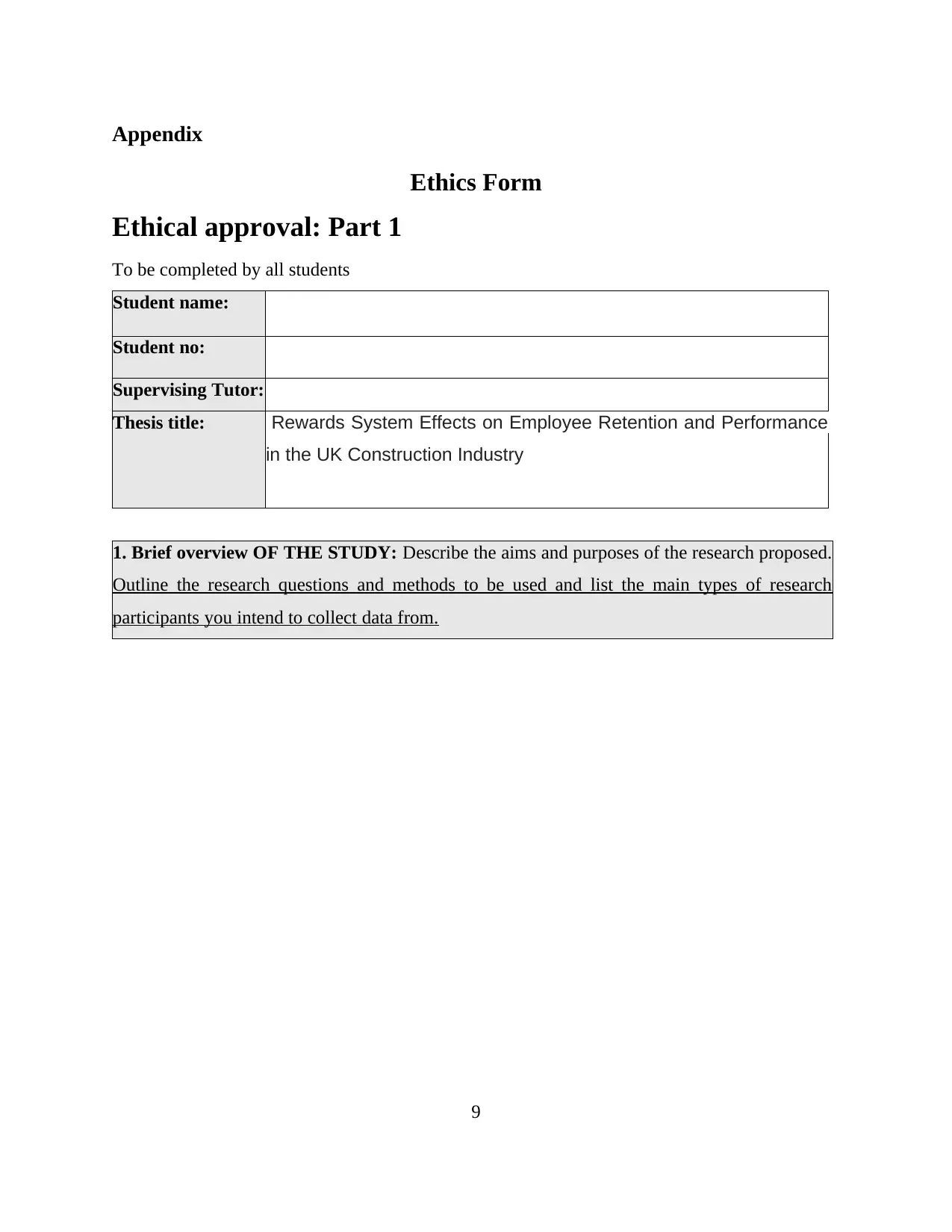
Appendix
Ethics Form
Ethical approval: Part 1
To be completed by all students
Student name:
Student no:
Supervising Tutor:
Thesis title: Rewards System Effects on Employee Retention and Performance
in the UK Construction Industry
1. Brief overview OF THE STUDY: Describe the aims and purposes of the research proposed.
Outline the research questions and methods to be used and list the main types of research
participants you intend to collect data from.
9
Ethics Form
Ethical approval: Part 1
To be completed by all students
Student name:
Student no:
Supervising Tutor:
Thesis title: Rewards System Effects on Employee Retention and Performance
in the UK Construction Industry
1. Brief overview OF THE STUDY: Describe the aims and purposes of the research proposed.
Outline the research questions and methods to be used and list the main types of research
participants you intend to collect data from.
9
⊘ This is a preview!⊘
Do you want full access?
Subscribe today to unlock all pages.

Trusted by 1+ million students worldwide
1 out of 22
Related Documents
Your All-in-One AI-Powered Toolkit for Academic Success.
+13062052269
info@desklib.com
Available 24*7 on WhatsApp / Email
![[object Object]](/_next/static/media/star-bottom.7253800d.svg)
Unlock your academic potential
Copyright © 2020–2026 A2Z Services. All Rights Reserved. Developed and managed by ZUCOL.





